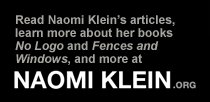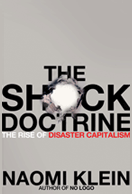The Shock Doctrine

Ideas on Economics
John Freeman, Newark Star-Ledger, September 16, 2007
According to one theory of globalization, the spread of free-market ideas across the globe has occurred in a series of natural if sometimes painful historical developments, and the unprecedented (and highly lucrative) access Western capital enjoyed to these emerging markets is essential to kick-starting democratic reform.
In this towering polemic, Naomi Klein demolishes this narrative, arguing that history tells a different story. Skipping across several decades and numerous U.S. administrations, Klein shows how the free-market ideas associated with Milton Friedman have spread often through catastrophe (as in Thailand, post-tsunami, and in New Orleans, post-Katrina) and at the point of a gun (as in Chile in 1973 and Iraq today). And that the violence necessary for such reforms to continue will only increase.
Many decades ago, Marxist historian Walter Rodney labeled a similar phenomenon the underdevelopment of Africa, in referring to (as he saw it) the deliberate molding of developing economies by imperialism to its own needs. Today Klein calls it the shock doctrine, due to the role shock and awe, in all forms, play in getting the local populace to cooperate: book-burning, widespread arrests and roundups, and even torture.
Readers of Howard Zinn's "A People's History" will recognize an ideological stance at work here. But Klein is not simply a woman with a bullhorn. A fierce writer whose prose has the metaphorical gusto of Susan Sontag's in its best moments, Klein manages to weave a narrative out of a large variety of historical events that is equal parts cultural commentary and investigative journalism.
But her most powerful segments deal with what's been happening here in recent years. Take, for instance, her ability to encapsulate the mess that is Iraq. Among other things, "The Shock Doctrine" shows how the growing role of civilian contractors, Abu Ghraib, the insurgency, and the constant, spooky presence of Halliburton in so many recent projects (which include the building of Guantánamo and the reconstruction of New Orleans) all stem from the shock doctrine.
Klein reminds us that, contrary to his public statements, Dick Cheney will profit enormously from his continued association with Halliburton. Here is why this book, angry as it is, deserves such a wide audience. It reminds that the purpose of government is to serve the most people as best it can. Under the shock doctrine, Klein argues, the opposite occurs: one class of people comes up with the plan, another does the fighting, and a third, way at the bottom, deals with the fallout. If you believe this assessment it's hard not to see why such policies earn what the CIA calls "blowback."
John Freeman is president of the National Book Critics Circle.
According to one theory of globalization, the spread of free-market ideas across the globe has occurred in a series of natural if sometimes painful historical developments, and the unprecedented (and highly lucrative) access Western capital enjoyed to these emerging markets is essential to kick-starting democratic reform.
In this towering polemic, Naomi Klein demolishes this narrative, arguing that history tells a different story. Skipping across several decades and numerous U.S. administrations, Klein shows how the free-market ideas associated with Milton Friedman have spread often through catastrophe (as in Thailand, post-tsunami, and in New Orleans, post-Katrina) and at the point of a gun (as in Chile in 1973 and Iraq today). And that the violence necessary for such reforms to continue will only increase.
Many decades ago, Marxist historian Walter Rodney labeled a similar phenomenon the underdevelopment of Africa, in referring to (as he saw it) the deliberate molding of developing economies by imperialism to its own needs. Today Klein calls it the shock doctrine, due to the role shock and awe, in all forms, play in getting the local populace to cooperate: book-burning, widespread arrests and roundups, and even torture.
Readers of Howard Zinn's "A People's History" will recognize an ideological stance at work here. But Klein is not simply a woman with a bullhorn. A fierce writer whose prose has the metaphorical gusto of Susan Sontag's in its best moments, Klein manages to weave a narrative out of a large variety of historical events that is equal parts cultural commentary and investigative journalism.
But her most powerful segments deal with what's been happening here in recent years. Take, for instance, her ability to encapsulate the mess that is Iraq. Among other things, "The Shock Doctrine" shows how the growing role of civilian contractors, Abu Ghraib, the insurgency, and the constant, spooky presence of Halliburton in so many recent projects (which include the building of Guantánamo and the reconstruction of New Orleans) all stem from the shock doctrine.
Klein reminds us that, contrary to his public statements, Dick Cheney will profit enormously from his continued association with Halliburton. Here is why this book, angry as it is, deserves such a wide audience. It reminds that the purpose of government is to serve the most people as best it can. Under the shock doctrine, Klein argues, the opposite occurs: one class of people comes up with the plan, another does the fighting, and a third, way at the bottom, deals with the fallout. If you believe this assessment it's hard not to see why such policies earn what the CIA calls "blowback."
John Freeman is president of the National Book Critics Circle.






















